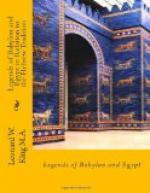(1) See Daiches, “Ezekiel and the Babylonian Account of the Deluge”, in the Jewish Quarterly Review, April 1905. It has of course long been recognized that Ezekiel, in announcing the punishment of the king of Egypt in xxxii. 2 ff., uses imagery which strongly recalls the Babylonian Creation myth. For he compares Pharaoh to a sea-monster over whom Yahweh will throw his net (as Marduk had thrown his over Tiamat); cf. Loisy, Les mythes babyloniens et les premiers chaptires de la Genese (1901), p. 87.
(2) Ezek. xiv. 21 f.
In the passage of the Babylonian Epic, Enlil had already sent the Flood and had destroyed the good with the wicked. Ea thereupon remonstrates with him, and he urges that in future the sinner only should be made to suffer for his sin; and, instead of again causing a flood, let there be discrimination in the divine punishments sent on men or lands. While the flood made the escape of the deserving impossible, other forms of punishment would affect the guilty only. In Ezekiel the subject is the same, but the point of view is different. The land the prophet has in his mind in verse 13 is evidently Judah, and his desire is to explain why it will suffer although not all its inhabitants deserved to share its fate. The discrimination, which Ea urges, Ezekiel asserts will be made; but the sinner must bear his own sin, and the righteous, however eminent, can only save themselves by their righteousness. The general principle propounded in the Epic is here applied to a special case. But the parallelism between the passages lies not only in the general principle but also in the literary setting. This will best be brought out by printing the passages in parallel columns.
Gilg. Epic, XI, 180-194 Ezek. xiv. 12-20
Ea opened his mouth and spake, And the word of the Lord came He said to the warrior Enlil; unto me, saying, Thou director of the gods! O Son of man, when a land sinneth warrior! against me by committing a Why didst thou not take counsel trespass, and I stretch out but didst cause a flood? mine hand upon it, and break On the transgressor lay his the staff of the bread transgression! thereof, and send famine




